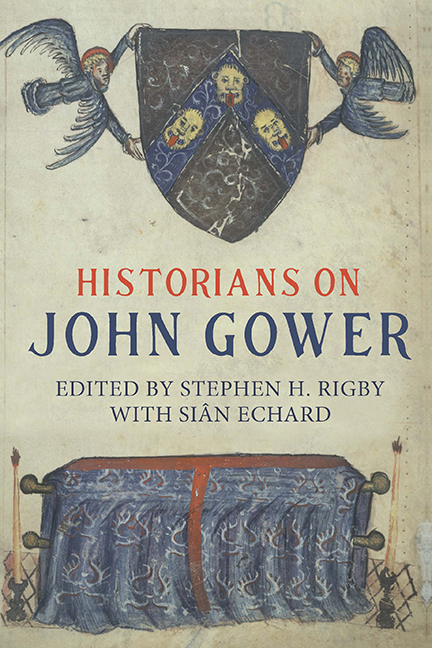Book contents
- Frontmatter
- Dedication
- Contents
- List of Illustrations
- Notes on Editors and Contributors
- Acknowledgements
- List of Abbreviations
- A Note on the References
- Preface: Gower in Context
- PART I Gower’s Life and Works
- PART II GOWER AND LAY SOCIETY
- PART III GOWER AND THE CHURCH
- PART IV GOWER AND GENDER
- PART V GOWER AND POLITICS
- PART VI GOWER AND COSMOGRAPHY
- Select Bibliography
- Index
- VOLUMES ALREADY PUBLISHED
3 - Nobility and Chivalry
Published online by Cambridge University Press: 26 May 2022
- Frontmatter
- Dedication
- Contents
- List of Illustrations
- Notes on Editors and Contributors
- Acknowledgements
- List of Abbreviations
- A Note on the References
- Preface: Gower in Context
- PART I Gower’s Life and Works
- PART II GOWER AND LAY SOCIETY
- PART III GOWER AND THE CHURCH
- PART IV GOWER AND GENDER
- PART V GOWER AND POLITICS
- PART VI GOWER AND COSMOGRAPHY
- Select Bibliography
- Index
- VOLUMES ALREADY PUBLISHED
Summary
Contexts and Competing Interpretations
Throughout his work, John Gower showed a deep concern with the roles and responsibilities the secular aristocracy should undertake and how the chivalric ethic might be properly applied. Given the socio-political environment in which he wrote, this is hardly surprising. The English position in the Hundred Years War (1337–1453) became increasingly parlous as Gower's life drew on and this brought with it a general sense of war weariness. In addition, over the course of the 1380s and 1390s, disillusionment grew with Richard II (1377–99), his court and the military community at large. Difficulties with dating Gower's works mean, however, that it is often difficult to link his opinions to specific historical events.1 As a result, a number of intriguing questions arise regarding Gower's attitudes to the chivalrous elite and how these attitudes may have evolved over time.
Various scholars have considered Gower's work in relation to the secular elite, the political world which its members inhabited, and the chivalric ethic that shaped their behaviour. Elliot Kendall, for example, has argued persuasively that a knowledge of the structures and intricacies of aristocratic households and of the wider world of retinues and affinities is vital when seeking to understand Confessio Amantis and suggests that Gower's opinions regarding the importance of a divinely-ordained social hierarchy can be explored in microcosm through imagery associated with the lordly domus magnificencie. Gower's works have also been used to suggest that a sense of disillusionment pervaded England in the final quarter of the fourteenth century and he is said by scholars such as Ben Lowe and Winthrop Wetherbee to have attributed the debilitating prolongation of the Hundred Years War and the degenerate conduct of the bellatores to the failings of the aristocracy and the corruption of chivalry. ‘I do not know how this happened’, Gower tells us in the Mirour de l’Omme (c. 1376–78), ‘nor whence the evil has come, but everyone alive nowadays can see that knighthood has been ruined [or lost]’ [Car ce voit bien cil q’ore vit, / Chivalerie est trop perdue] (23977–80). Many of Gower's remarks imply that when nobles waged war, their motives were sinful and that the consequences were often disastrous for the nation. In Confessio Amantis Genius warns us, repeatedly and emphatically, about the evils of warfare as well as the absurdity of knightly endeavours motivated by love and romantic ideals.
- Type
- Chapter
- Information
- Historians on John Gower , pp. 141 - 165Publisher: Boydell & BrewerPrint publication year: 2019

